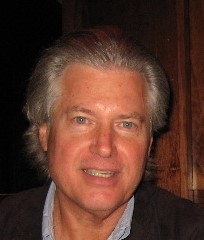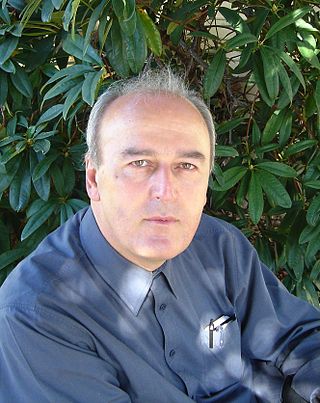Related Research Articles
Evolutionary linguistics or Darwinian linguistics is a sociobiological approach to the study of language. Evolutionary linguists consider linguistics as a subfield of sociobiology and evolutionary psychology. The approach is also closely linked with evolutionary anthropology, cognitive linguistics and biolinguistics. Studying languages as the products of nature, it is interested in the biological origin and development of language. Evolutionary linguistics is contrasted with humanistic approaches, especially structural linguistics.

Ferdinand de Saussure was a Swiss linguist, semiotician and philosopher. His ideas laid a foundation for many significant developments in both linguistics and semiotics in the 20th century. He is widely considered one of the founders of 20th-century linguistics and one of two major founders of semiotics, or semiology, as Saussure called it.
The proto-human language, also known as proto-sapiens or proto-world, is the hypothetical direct genetic predecessor of all human languages.
Historical linguistics, also termed diachronic linguistics, is the scientific study of language change over time. Principal concerns of historical linguistics include:
- to describe and account for observed changes in particular languages
- to reconstruct the pre-history of languages and to determine their relatedness, grouping them into language families
- to develop general theories about how and why language changes
- to describe the history of speech communities
- to study the history of words, i.e. etymology
- to explore the impact of cultural and social factors on language evolution.
Cognitive linguistics is an interdisciplinary branch of linguistics, combining knowledge and research from cognitive science, cognitive psychology, neuropsychology and linguistics. Models and theoretical accounts of cognitive linguistics are considered as psychologically real, and research in cognitive linguistics aims to help understand cognition in general and is seen as a road into the human mind.

Generative grammar, or generativism, is a theoretical approach in linguistics that regards grammar as a domain-specific system of rules that generates all and only the grammatical sentences of a given language. In light of poverty of the stimulus arguments, grammar is regarded as being partly innate, the innate portion of the system being referred to as universal grammar. The generative approach has focused on the study of syntax while addressing other aspects of language including semantics, morphology, phonology, and psycholinguistics.
The origin of language, its relationship with human evolution, and its consequences have been subjects of study for centuries. Scholars wishing to study the origins of language must draw inferences from evidence such as the fossil record, archaeological evidence, contemporary language diversity, studies of language acquisition, and comparisons between human language and systems of animal communication. Many argue that the origins of language probably relate closely to the origins of modern human behavior, but there is little agreement about the facts and implications of this connection.
Michael Tomasello is an American developmental and comparative psychologist, as well as a linguist. He is professor of psychology at Duke University.
Bernd Heine is a German linguist and specialist in African studies.
Michael Studdert-Kennedy was an American psychologist and speech scientist 1927–2017.https://haskinslabs. We org/news/michael-studdert-kennedy. He is well known for his contributions to studies of speech perception, the motor theory of speech perception, and the evolution of language, among other areas. He is a professor emeritus of psychology at the University of Connecticut and a professor emeritus of linguistics at Yale University. He is the former president (1986–1992) of Haskins Laboratories in New Haven, Connecticut. He was also a member of the Haskins Laboratories Board of Directors and was chairman of the board from 1988 until 2001. He was the son of the priest and Christian socialist Geoffrey Studdert-Kennedy.
Chris Knight is a British anthropologist.
Simon M. Kirby is a British cognitive scientist, currently holding the Chair of Language Evolution at the University of Edinburgh, where he is Director of the Graduate School, and Programme Director for the MSc in the Evolution of Language and Cognition. He specializes in evolutionary computational models of human language and its development.

The evolutionary origin of religion and religious behavior is a field of study related to evolutionary psychology, the origin of language and mythology, and cross-cultural comparison of the anthropology of religion. Some subjects of interest include Neolithic religion, evidence for spirituality or cultic behavior in the Upper Paleolithic, and similarities in great ape behavior.

John L. Locke is an American biolinguist who has contributed to the understanding of language development and the evolution of language. His work has focused on how language emerges in the social context of interaction between infants, children and caregivers, how speech and language disorders can shed light on the normal developmental process and vice versa, how brain and cognitive science can help illuminate language capability and learning, and on how the special life history of humans offers perspectives on why humans are so much more intensely social and vocally communicative than their primate relatives. In recent time he has authored widely accessible volumes designed for the general public on the nature of human communication and its origins.
James Higginbotham FBA was a distinguished professor of Linguistics and Philosophy at the University of Southern California. He taught previously at the Massachusetts Institute of Technology, Columbia University, and at the University of Oxford as a Fellow of Somerville College, Oxford.

Joseph Jordania is an Australian–Georgian ethnomusicologist and evolutionary musicologist and professor. He is an Honorary Fellow of the Melbourne Conservatorium of Music at the University of Melbourne and the Head of the Foreign Department of the International Research Centre for Traditional Polyphony at Tbilisi State Conservatory. Jordania is known for his model of the origins of human choral singing in the wide context of human evolution and was one of founders of the International Research Centre for Traditional Polyphony in Georgia.

The origin of speech differs from the origin of language because language is not necessarily spoken; it could equally be written or signed. Speech is a fundamental aspect of human communication and plays a vital role in the everyday lives of humans. It allows them to convey thoughts, emotions, and ideas, and providing the ability to connect with others and shape collective reality.
Grooming, Gossip and the Evolution of Language is a 1996 book by the anthropologist Robin Dunbar, in which the author argues that language evolved from social grooming. He further suggests that a stage of this evolution was the telling of gossip, an argument supported by the observation that language is adapted for storytelling.
Theory of language is a topic in philosophy of language and theoretical linguistics. It has the goal of answering the questions "What is language?"; "Why do languages have the properties they do?"; or "What is the origin of language?". In addition to these fundamental questions, the theory of language also seeks to understand how language is acquired and used by individuals and communities. This involves investigating the cognitive and neural processes involved in language processing and production, as well as the social and cultural factors that shape linguistic behavior.
Daniel Dor is an Israeli linguist, media researcher and political activist. He is a professor in the Dan Department of Communication in Tel Aviv University. He has written extensively on language and its evolution, as well as on the role of the media in the construction of political hegemony. His theory of language is described in The Instruction of Imagination: Language as a Social Communication Technology (2015).
References
- ↑ "Hurford, Prof. James Raymond", Who's Who (Oxford University Press, December 2017). Retrieved 30 June 2018.
- ↑ Jim Hurford Home Page James Hurford home page
- ↑ International Conferences on the Evolution of Language.
- ↑ "British Academy New Fellows 2015" (PDF). British Academy. Retrieved 2 November 2016.
- ↑ Books by Jim Hurford
- ↑ Review in Times Higher Education